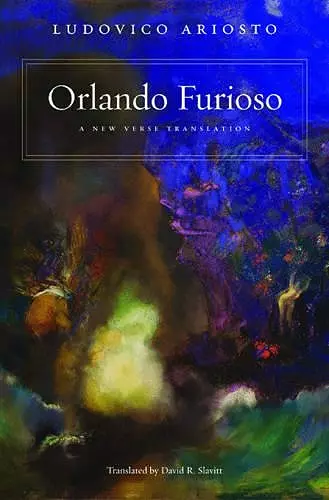Orlando Furioso: A New Verse Translation
Ludovico Ariosto author David R Slavitt translator Charles S Ross editor
Format:Paperback
Publisher:Harvard University Press
Published:14th Jun '11
Currently unavailable, and unfortunately no date known when it will be back

This is an immensely skillful, useful, and entertaining translation, provocative of out loud laughter sometimes, as well as the thrill of melodrama. It makes available to English readers a work previously languishing in the category of the unclimbable mountain. The result is immediate and enriching. -- Henry Taylor
With this lively new verse translation of one of the great literary achievements of the Italian Renaissance, Slavitt introduces readers to Ariosto’s now-neglected masterpiece—a poem whose impact on Western literature can scarcely be exaggerated. Slavitt’s translation captures the energy, comedy, and great fun of Ariosto’s Italian.The appearance of David R. Slavitt’s translation of Orlando Furioso (“Mad Orlando”), one of the great literary achievements of the Italian Renaissance, is a publishing event. With this lively new verse translation, Slavitt introduces readers to Ariosto’s now neglected masterpiece—a poem whose impact on Western literature can scarcely be exaggerated. It was a major influence on Spenser’s Faerie Queene. William Shakespeare borrowed one of its plots. Voltaire called it the equal of the Iliad, the Odyssey, and Don Quixote combined. More recently, Italo Calvino drew inspiration from it. Borges was a fan. Now, through translations of generous selections from this longest of all major European poems, Slavitt brings the poem to life in ways previous translators have not. At the heart of Ariosto’s romance are Orlando’s unrequited love for the pagan princess Angelica and his jealous rage when she elopes. The action takes place against a besieged Paris, as Charlemagne and his Christian paladins defend the city against the Saracen king. The poem, however, obeys no geography or rules but its own, as the story moves by whim from Japan to the Hebrides to the moon; it includes such imaginary creatures as the hippogriff and a sea monster called the orc. Orlando Furioso is Dante’s medieval universe turned upside down and made comic. Characterized by satire, parody, and irony, the poem celebrates a new humanistic Renaissance conception of man in an utterly fantastical world. Slavitt’s translation captures the energy, comedy, and great fun of Ariosto’s Italian.
This is an immensely skillful, useful, and entertaining translation, provocative of out loud laughter sometimes, as well as the thrill of melodrama. It makes available to English readers a work previously languishing in the category of the unclimbable mountain. The result is immediate and enriching. -- Henry Taylor
An at times intentionally zany new version of one of the literary high points of the Italian Renaissance, an epic crowded with jousting men and monsters that influenced Spencer's 'Faerie Queen,' that Shakespeare lifted a plot from, and that Italo Calvino and Jorge Luis Borges admired. Slavitt's spiffy translation entertainingly reinvigorates the melodramatic, satiric, battle-heavy antics of Ariosto's prolix fantasy. -- Bill Marx * The World (Public Radio International) *
In David R. Slavitt's exuberant new version, Orlando Furioso (1532) makes for quite wonderful seasonal entertainment. Slavitt's easygoing, colloquial approach possesses a lightness and brio, a sweet playfulness (touched with irony) that carries the reader effortlessly, happily along… Ariosto's irresistible masterpiece effortlessly blends chivalry, love and magic. Think of it as a knightly soap opera, complete with cliff-hangers, erotic intrigue and one melodramatic improbability after another, all of it conveyed with just the right colloquial bounce… The whole book is clever and fun. -- Michael Dirda * Washington Post *
Orlando Furioso is regarded as the literary masterpiece of the Italian Renaissance… So why did the English-speaking world give up on this poem? Its main themes are sex and war—usually a winning formula. Could previous translations be partly to blame? It seems so… David R. Slavitt's major achievement is his re-creation of Ariosto's stylistic range… Ariosto's text ranges across the entire linguistic spectrum, from the everyday to the sublime, and so too does Slavitt's… Slavitt's octaves are skillfully constructed, each one with its own self-contained mood and pace, and ending on a rhyming couplet that often takes the form of a pithy concluding comment… Perhaps a purist would object to the slang, and contemporary allusions in this new translation, but they are in keeping with the spirit of the poem. Slavitt injects Ariostan irreverence back into the Furioso and opens it up to a wider anglophone readership. His translation is witty, energetic, playful, outrageous, yet serious and sombre too. Crucially, it is effortlessly readable. -- Doireann Lalor * Times Literary Supplement *
Despite its monumental length, its heroic subjects, and its atmosphere of changing times, Orlando Furioso is anything but elegiac in its tone; it is the sixteenth-century version of Monty Python and the Holy Grail, a send-up with biting social commentary, outrageous adventures, over-the-top violence, a sexual merry-go-round, and humor at every level from the most refined to the most sophomoric. Most Renaissance jokes are as lame after five centuries as their modern equivalents will prove to be, but Ariosto can still make anyone laugh… Slavitt has made a translation of manner as well as substance; but his seemingly casual asides are anything but casual—the translation itself is a masterpiece of sprezzatura. Slavitt has been impeccably careful, but he has also had an extravagantly good time… This new Orlando Furioso, however provocative it may be on its surface, is thoroughly under control. -- Ingrid Rowland * New York Review of Books *
- Nominated for Aldo and Jeanne Scaglione Prize for a Translation of a Literary Work 2009
ISBN: 9780674060128
Dimensions: unknown
Weight: unknown
688 pages